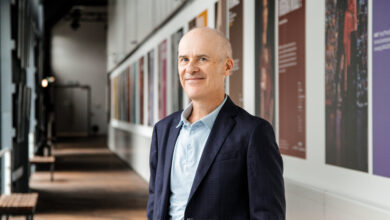Tracey Spicer and Your Side CEO get real in new conversation series

Walkley award winning journalist Tracey Spicer has teamed up with support service provider Your Side to canvas the major issues facing the aged care sector.
In a filmed eight part In Conversation series Spicer and Your Side chief executive Danielle Ballantine will tackle the workforce crisis, future reforms and the hurdles to achieving quality care.
Spicer, who recently became an ambassador for Your Side, has been a longtime advocate for seniors and women's rights.
"We just won’t see the improvements in quality care we expect unless we improve pay and training for workers delivering care support and services,” she said.
Tracey and Danielle both joined Aged Care Insite to speak about the series and the power of advocacy to instigate change.
ACI: As an aged care provider in the landscape of COVID-19 and the royal commission, there’s a lot of mistrust in the community – how can people like you help to rebuild this?
DB: It is as simple as delivering on your promise. As humans, we build trust by doing as we say we will do. But to do that, organisations need to have a good culture where staff are respected, empowered and valued. If we value our people who deliver the care, and recruit for culture fit, staff will work hard to support clients. A lot of clients are referred by word of mouth which continues to motivate us to always deliver on what we say that we will do.
It’s also really important to be open and transparent. About what we are doing to prevent abuse, about what the fees are, and about what the challenges are that we are facing.
What is the goal of these ‘In Conversation’ sessions? Why are they important?
DB: Our overall goal is to have open conversations about care - both for individual families and for the sector.
With Tracey, Your Side is bringing attention to issues facing the sector, such as workforce shortages, burnout and improving the quality of care. Having Tracey’s voice helps us start a real conversation about how we get together and find real solutions.
This conversation needs to include government, sector and the community. Too often it’s just two of those three.
On a more personal level, time and again we hear that many people find it difficult to navigate aged care. This was reinforced through the Royal Commission. Working with Tracey, we have been running a campaign encouraging people to plan for care. We encourage people to start conversations with family early and avoid a crisis, where any kind of care is better than no care at all.
How has it been teaming up with Tracey? How can public figures draw more awareness to the issues happening in aged care?
DB: It's unique to have an ambassador for our sector, but aged care is something that we will all experience in our lives; whether it is through loved ones or our own care. As an award winning journalist, known for tackling social issues, Tracey has drawn attention to the important aspects of Aged Care, especially in the wake of the Royal Commission recommendations.
Aged care affects every single one of us. We all age. We should normalise having conversations in our families about our individual needs and preferences, as well as at a broader level about what system we want to have to meet those needs.
For example, one of the things we know is that openly talking about and valuing care and being involved reduces the chance of abuse happening.
It’s also by having open conversations that we can plan as families and avoid crisis, and make genuinely informed decisions.
Lastly, as a society, we need to have a very big conversation about how we fund the changes we want. We want professional, well-trained workers. That will cost money. We have to agree we are willing to spend that money.
What are your hopes for the future of the sector as these reforms play out? How do you plan to navigate these pressures as a provider?
DB: Let’s talk about the workforce – right now, we have a workforce crisis. We already had an established worker shortage prior to COVID. The pandemic has stretched our workforce to breaking point, and at a time when more people need support to age at home.
The Royal Commission showed us that we value care of older people. We also need to value the workforce. We currently pay frontline aged care workers around the same as we do people in fast food roles. Each of these roles requires hard work, but let’s not underestimate the intimate personal interaction and observational skills required by an aged care worker. How can we attract and retain a quality and qualified workforce to look after mum, dad and eventually us, especially during the more complex parts of care such as dementia or medication, if the pay does not reflect the responsibilities?
We need a coordinated response. To clear the home care waiting lists we need to recruit and train a workforce to do the work. The projected demand for workers far outstrips current supply, and the existing aged care workforce earn, in many cases, a dollar more an hour than minimum wage. We have an ageing population and an ageing workforce, particularly in clinical care in aged care. There are two things that need to be addressed – firstly, recruitment of younger workers and retainment of these workers which means that we need to address pay and provide more attractive career pathways.
We need to set a direction where people see care work as a vocation with a career path. Right now, there is no minimum training requirement, and many care staff learn on the job. People see the role as stop-gap, not as a role with clear career pathways. If we lift the professional standards and the rewards of working in the sector, quality of care will improve.
As an aged care ambassador and an advocate for women’s rights, what key issues happening in the sector are you looking to highlight in the New Year?
TS: For the sector, I would hope that the value of care work is recognised. Paid care work is dominated by women. My hope is that it is seen as a vocation, the same way that nursing has increasingly been valued over the years.
If we don’t have a respected, well paid care workforce, this also will disproportionately impact women who are likely to exit the workforce to look after their parents. Two thirds (or 70%) of primary carers are women, and the value of this care to the economy is larger than some big industries, like hospitality, IT, tourism accommodation. We need to make sure we give them support. These life-changing roles are either unpaid or underpaid, and that's not good enough in a society that purports to care for its elders. We need to give carers the support, respect, and payment they deserve.
What have you done since you took up an ambassadorship that you are most proud of and why?
TS: I'm proud to have played a role in the team that broadcast a powerful conversation about the future of the aged care sector. One of the webinars I facilitated with Your Side brought together experts in the care of elders who are First Nations, LGBTQI+ and from multicultural backgrounds. It was incredibly enlightening to hear about what we can all do to make sure the next generation of elders receives the specific support they need. This was a wonderful opportunity for people in the sector to share ideas about what to do when facing the challenges ahead.
How has your experience as a journalist influenced your advocacy in the aged care space?
TS: Over the past 35 years as a journalist, I've covered countless stories about the aged care sector. In the past, the elderly were framed as passive recipients of care.
I've seen significant changes recently, with moves to put the person receiving care at the centre of the system. This change is long overdue.
You said caring for your grandfather and your own father gave you a deeper understanding of what Australians face as they age – how have these experiences impacted yourself and your family? Did it change your view of aged care in any way?
TS: It really opened my eyes to the challenges faced by every single family across the country. The system is extremely complex. While there is government support available, navigating the system is incredibly difficult. It was a privilege to care for my grandfather during this tough time, but there was an awful lot of impenetrable information to wade through.
Families should be able to spend quality time with their loved ones as they age, rather than wasting countless hours online or on the phone trying to get support. However, this experience has made it a little easier for my sister and I to assist our beloved father in his later years. Truly, there needs to be a complete rethink of the aged care system.
Looking forwards, what are your hopes for the future of aged care?
TS: I hope it becomes a person-centred system that's easy to navigate for every family across the country. Our elders are precious. We need to treat them with the respect they deserve.
Email: [email protected]





